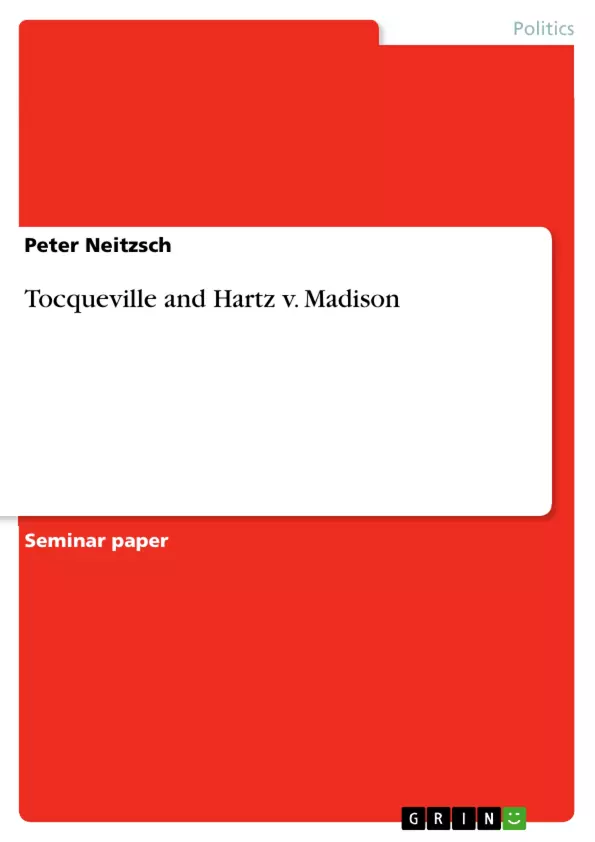This essay discusses the question whether – regarding the United States in the late 18th and 19th centuries – we should consider that political values or political institutions were more responsible for the maintenance of democratic practices. For this purpose the arguments of Madison, Tocqueville and Hartz are reconsidered. Since the fall of Rome there was no long lasting democracy in the history of mankind, though there had been several attempts to establish one, all failed in terms of duration. So the founding fathers of the American Constitution in the late 18th century were deeply concerned about the possible failure of the young democracy. So far all empirical evidence supported Platon’s teachings of a cycle of returning political regimes that led inevitably from democracy to oligarchy to dictatorship and again to monarchy. The construction of a political system that was both democratic and stable had never worked before. So the main question of this essay, whether political values or political institutions were more responsible for the maintenance of democratic practices, was essential to the people of that time.
The Federalists’ most important question is: How can one create a stable political order that is still free and democratic? Their answer is: By carefully constructing the political institutions in a way that compensates the imperfection of man. In contrast to this Tocqueville and, tying up to him, Hartz are pointing out the necessity of political values to maintain democratic practices. In my opinion, institutions are more important than political culture in order to create a stable political system, but surely both factors cannot be isolated from each other. Not only do they strongly depend on each other but can probably even be regarded as two sides of the same coin. To prove this thesis I will first introduce the different approaches of Madison, substitutional for The Federalists, who favour a strong state, and of Tocqueville and Hartz, who rather accentuate the importance of political culture and civic virtues. In my opinion all three authors agree on the relevance of both pillars of democracy – polities and culture. Indeed, I believe that Tocqueville recognises the need for strong institutions just as much as Madison. Furthermore I want to introduce “economic prosperity” as a third stability granting factor to which in my opinion is paid too little attention by the relevant authors.
Table of Contents
- The maintenance of democracy
- Madison and The Federalists in favour of a strong state
- Tocqueville's and Hartz' accentuation of political culture and civic virtues
- Is there really so much difference between Madison and Tocqueville?
- The economic prosperity as a third stability granting factor
- Conclusion
Objectives and Key Themes
This essay explores the factors that contributed to the maintenance of democratic practices in the United States during the late 18th and 19th centuries. It investigates whether political values or political institutions played a more significant role in ensuring the stability and longevity of American democracy.
- The importance of strong political institutions in mitigating the risks of factionalism and tyranny.
- The role of political culture and civic virtues in fostering a shared sense of national identity and democratic values.
- The influence of economic prosperity on the stability of political systems.
- The interconnectedness of political institutions, culture, and economic factors in maintaining democracy.
- The significance of the Federalist Papers in shaping the early American political landscape.
Chapter Summaries
The essay begins by examining the historical context of democracy in the United States, highlighting the challenges faced by the founding fathers in establishing a stable and enduring democratic system. Chapter II introduces the Federalists, particularly Madison, and their emphasis on strong political institutions as a means to prevent the tyranny of majority factions. Chapter III explores Tocqueville and Hartz's contrasting perspective, emphasizing the crucial role of political culture and civic virtues in maintaining democratic practices. Chapter IV delves into the question of whether there is a significant difference between Madison and Tocqueville's views, arguing that both recognized the importance of both institutions and culture. Chapter V introduces economic prosperity as a third factor contributing to democratic stability.
Keywords
This essay focuses on the key concepts of democracy, political institutions, political culture, civic virtues, factionalism, economic prosperity, and the Federalist Papers. It analyzes the contributions of prominent figures like Madison, Tocqueville, and Hartz, and their perspectives on the factors that contributed to the longevity and stability of the American democratic system. The essay highlights the importance of understanding the historical context and the interplay of political institutions, values, and economic conditions in shaping the development and maintenance of democracy.
Frequently Asked Questions
What is the central debate regarding the maintenance of American democracy?
The debate focuses on whether political institutions (as argued by James Madison) or political values and civic virtues (as argued by Alexis de Tocqueville and Louis Hartz) were more responsible for the stability of the young democracy.
What was James Madison's view on political institutions?
Madison and the Federalists believed that a stable democracy could only be maintained through carefully constructed institutions (checks and balances) that compensate for human imperfection and prevent the tyranny of factions.
How did Tocqueville's perspective differ from Madison's?
Tocqueville emphasized the importance of "political culture" and "civic virtues." He argued that democratic practices rely on the habits, customs, and shared values of the citizens rather than just legal structures.
What is the "third factor" of stability mentioned in the essay?
The author introduces "economic prosperity" as a crucial third factor that grants stability, arguing it is often overlooked by the primary political theorists of the era.
Are institutions and culture truly separate factors?
The essay argues they are two sides of the same coin; institutions depend on a supportive culture to function, and culture is often shaped and protected by the institutions themselves.
- Citation du texte
- Peter Neitzsch (Auteur), 2006, Tocqueville and Hartz v. Madison, Munich, GRIN Verlag, https://www.grin.com/document/63241



